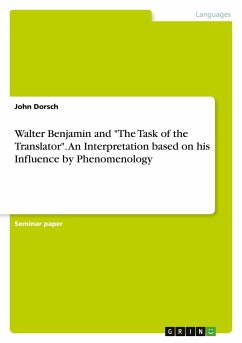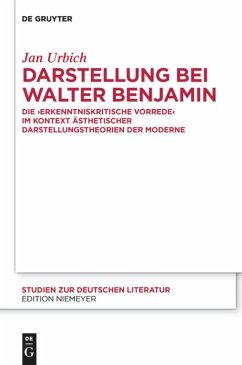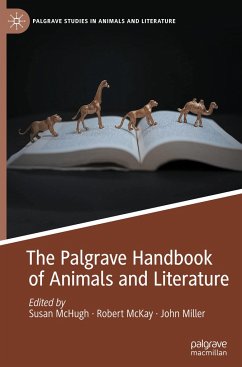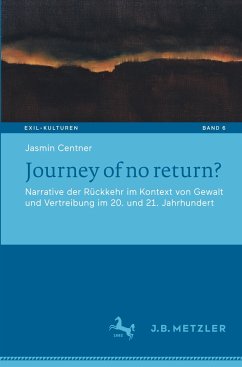
Walter Benjamin and "The Task of the Translator". An Interpretation based on his Influence by Phenomenology

PAYBACK Punkte
0 °P sammeln!
Studienarbeit aus dem Jahr 2014 im Fachbereich Literaturwissenschaft - Vergleichende Literaturwissenschaft, Note: 1,0, Eberhard-Karls-Universität Tübingen, Sprache: Deutsch, Abstract: In "The Task of the Translator", Walter Benjamin sets forth what he believes to be the true goal of any work of translation. Instead of conforming to the reader, a translation should conform to the source and target language of the work, the purpose of which is to expose the relationship between the two languages, how each complements the other in its use. But is there more to Benjamin's Task than that?Walter B...
Studienarbeit aus dem Jahr 2014 im Fachbereich Literaturwissenschaft - Vergleichende Literaturwissenschaft, Note: 1,0, Eberhard-Karls-Universität Tübingen, Sprache: Deutsch, Abstract: In "The Task of the Translator", Walter Benjamin sets forth what he believes to be the true goal of any work of translation. Instead of conforming to the reader, a translation should conform to the source and target language of the work, the purpose of which is to expose the relationship between the two languages, how each complements the other in its use. But is there more to Benjamin's Task than that?
Walter Benjamin is commonly thought of as a Neukantianer because of his influence by the Marburger school, especially Cohen. Little is known, however, about his influence by Husserl's school of phenomenology. In this paper, we will determine Benjamin's influence by phenomenology by first developing a concise conception of intentionality based on a close reading of Husserl's principle work Logische Untersuchungen, as intentionality is the key term linking Benjamin to the phenomenological tradition. We will then provide a novel interpretation of Benjamin's essay "Die Aufgabe des Übersetzers" by focusing on his use of the phenomenological term 'intention' and, with help of Benjamin's fragments on the philosophy of language-where he also used the term intention in the phenomenological sens, provide a novel understanding of what Benjamin means by "das Gemeinte" and "die Art des Meinens" with respect to his theory of translation.
Walter Benjamin is commonly thought of as a Neukantianer because of his influence by the Marburger school, especially Cohen. Little is known, however, about his influence by Husserl's school of phenomenology. In this paper, we will determine Benjamin's influence by phenomenology by first developing a concise conception of intentionality based on a close reading of Husserl's principle work Logische Untersuchungen, as intentionality is the key term linking Benjamin to the phenomenological tradition. We will then provide a novel interpretation of Benjamin's essay "Die Aufgabe des Übersetzers" by focusing on his use of the phenomenological term 'intention' and, with help of Benjamin's fragments on the philosophy of language-where he also used the term intention in the phenomenological sens, provide a novel understanding of what Benjamin means by "das Gemeinte" and "die Art des Meinens" with respect to his theory of translation.













